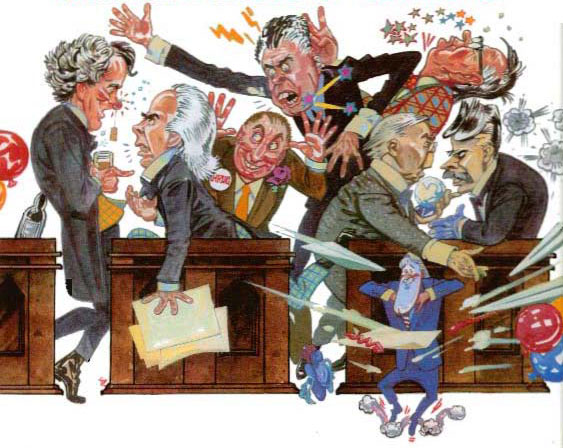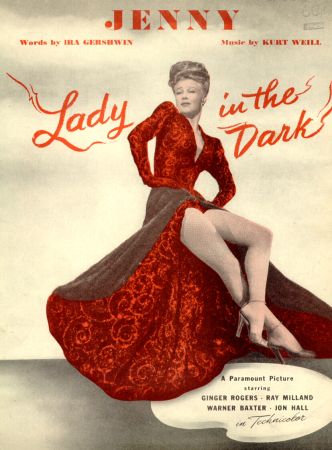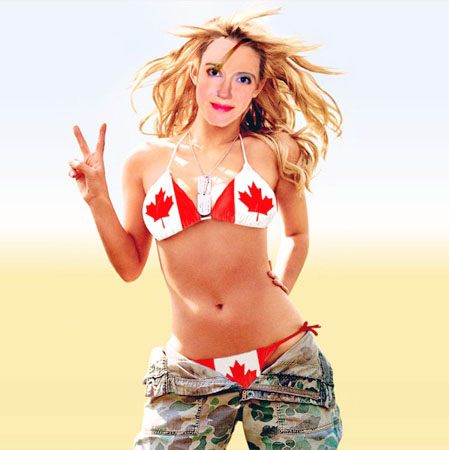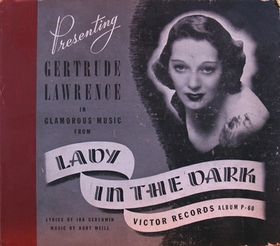Holiday political polls in Canada … anyone with vision comes to this decision – don’t make up your mind!
Dec 16th, 2010 | By Randall White | Category: In Brief[UPDATED MARCH 30, 2011]. Ira Gershwin’s lyrics to the Kurt Weill tune, “The Saga of Jenny,” from the 1941 Broadway musical Lady in the Dark, has some appropriate seasonal allusions in 2010: “Jenny made her mind up when she was three / She herself was going to trim the Christmas tree / Christmas Eve she lit the candles, tossed the tapers away / Little Jenny was an orphan on Christmas day.”
The dramatic last two lines of this Gershwin lyric also nicely summarize the best advice for anyone looking at the latest opinion polls on Canadian federal politics in mid December 2010 (and if you have three minutes and 17 seconds to spare, you can hear Gertrude Lawrence belt these lines out with conviction on You Tube, from the original cast recording): “Anyone with vision comes to this decision – Don’t … make … up … your … mind.”

From the cover of Lloyd Duhaime’s 1992 book, Hear! Hear! 125 Years of Debate in Canada's House of Commons.
To start with, travel back to December 6, 2010 – a mere 10 days ago. Éric Grenier is reporting in the Globe and Mail: “According to ThreeHundredEight.com’s latest vote and seat projections, the Tories now enjoy the support of 34.6% of Canadians.” The Liberals have “29.4% … The New Democrats … 16.4% … the Bloc Québécois has 9.9% … nationally, and the Greens … 8.5%.” And then in the same newspaper on the same day, we learn : “Stephen Harper’s Conservatives are headed toward a majority government without the help of Quebec … The Nanos end-of-year survey … has the Tories” at “38.1% … nationally compared to 31.2%” for the Liberals. “The NDP is at 17.2%; the Green Party … only 3.2% … and the Bloc is at 10.2%.”
Now, move on to December 8, 2010. A new Angus Reid poll, reported on in the Toronto Star, is telling us that: “The Conservatives have the support of 38% of voters and the Liberals 26% … The New Democrats have the backing of 18% … and the Bloc Quebecois has 10%.” And then on December 10, we discover from the Montreal Gazette that: “new findings by Ipsos Reid raise questions whether Harper will try to precipitate an election next spring, or perhaps even earlier in 2011 … According to the survey conducted this week, the Conservatives are supported by 39% of decided voters … Michael Ignatieff’s Liberals remain at 29 per cent of the decided vote.”

Lady in the Dark was made into a movie in 1944 with Ginger Rogers in the Gertrude Lawrence role: this would seem to be the cover of sheet music for The Saga of Jenny, published in connection with the movie.
So … you might think: whatever else, as the year comes to an end the Harper Conservatives are looking pretty good – at least as such things are judged in Canadian federal politics nowadays. But wait a minute. That would be a bit too much like the Jenny who made her mind up when she was only three. On the same December 10, 2010 the Globe and Mail is reporting that a new EKOS poll “gives the Conservatives 33.7% support compared to 29.2% for Michael Ignatieff’s Liberals. Jack Layton and his New Democrats have 14.4% … the Green Party is at 10.4% … and the Bloc Québécois is at 9.8%.”
Of course, you may believe the Conservative rumour that EKOS polls are systematically unfavourable to the Conservatives (while not crediting the rumour that Nanos polls often seem to work in the opposite direction). But then what do you make of the latest December 15, 2010 report, in various media outlets, that: “A new Harris-Decima poll conducted for The Canadian Press suggests the Tories have the support of 31% of Canadians, statistically tied with the Liberals at 29%”? (And note as well that: “Nationally [this] … latest survey put NDP support at 15 per cent and the Greens’ at 11.”)
If all these numbers just confuse you, join the club. But as a confused summary, note that over the past 10 days the Harper Conservatives have been variously but sequentially reported as having the support of 34.6%, 38.1%, 38%, 39%, 33.7%, and 31% of all Canadians, coast to coast to coast. The Liberals have been said to have 29.4%, 31.2%, 26%, 29%, 29.2%, and 29%. The one consistency through all these numbers has been that the Liberals and New Democrats together have always had greater percentages of support than the Conservatives. (Ie, 45.8%, 48.4%, 44%, 41%, 43.6%, 44%. Or as Chantal Hébert observed yesterday: “If NDP and Liberal leaders Jack Layton and Michael Ignatieff had taken the advice of their elder statesmen and looked for a way to pool forces earlier this year, the result of their joint efforts would likely be doing better in the polls than their separate parties.”)

Jenny grows up in Canada 2010: this “Attack of the Redneck Mommy” voter is saying yes to yet another federal election in 2011. It’s time to reshuffle the deck, even if everyone does wind up with pretty much the same hand?
Meanwhile, what, you may ask, does it all mean for the current leading question of Canadian federal politics: will there be an election next year? There seems much agreement that, on the very latest numbers: “no party should be eager for an election any time soon.” Susan Delacourt, while broadly agreeing with this assessment, also notes that as the House wraps up until the end of January next year, all parties are saying they are ready for an election soon, if someone else precipitates it. She notes as well that “Joe Comartin, the veteran NDP MP from Windsor” has “said he’s still not convinced there will be an election in the spring given that the Bloc Québécois is already making noises about supporting the Conservative budget … Still, Comartin said that doesn’t rule out the Conservatives putting something so unpalatable in the budget that no opposition party will be able to support it.” (And then there is still the counterweights editors’ “final word of half-support” for the argument that, what with whatever someone is putting in the water these days, one way or another, the 40th Parliament of Canada is not long for this world. Then again there is this, just in, from John Ibbitson at the Globe and Mail: “Ignatieff set to trigger election call in New Year.” The NDP and the Bloc would still have to co-operate, of course, but … Oh, and just to add to all the confusion check out the very latest: “Tories and Liberals get grim rating in year-end poll.”)
UPDATE MARCH 30, 2011: So … times have changed at least a bit since two weeks before Christmas 2010. And we’re now in the midst of a federal election campaign that will end with all those adult Canadian people who feel so inclined casting their ballots on May 2, 2011.
As far as opinion polls go, here is the first in what promises to be a daily (or near-daily?) series by Nick Nanos for the Globe and Mail: “Harper 10 points up in early days of stagnant campaign.”
Down on the ground where we the common people live, one big question about the final result on May 2 is will the Harper Conservatives win a majority of seats in the elected branch of Parliament at last? And what would happen if they did? See Citizen X on “Would Harper majority government in Canada be like Cameron-Clegg coalition government in UK?”
At counterweights, at this stage of the game, we still think the underlying message of the article above – “anyone with vision comes to this decision : don’t make up your mind!” – still makes some sense. See, eg: “The Canadian federal election of 2011 : was Diefenbaker right about polls?” (and especially the comment at the end by Alexandre Blanchet); and “There is an alternative to a Harper majority and it isn’t a ‘coalition’ (or yet another Harper minority).”


Critics estimate that government spending has increased by between 14 percent and 16 percent since the Conservatives gained power in January 2006 … Now another question from Ontario. Ill admit that this one comes from me and not from a reader …
[From cw editors’ : we’re a bit confused by this comment too, but the Monex Investigation website does seem interesting — http://monex.to/!]